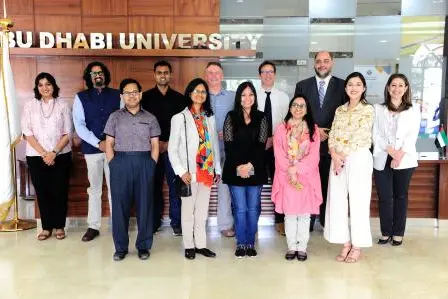PHOTO
Abu Dhabi, United Arab Emirates: Abu Dhabi University (ADU) hosted a delegation from the Department of Health Sciences at the University of York, UK, to discuss comorbidity and a joint study on ‘Behavioral Activation for Comorbid Depression in Non-communicable Disease (BEACON)’. The study was conducted in India, Bangladesh, and Pakistan.
Comorbidity refers to the presence of more than one physical or mental illness at the same time – such as anxiety and depression. BEACON explores ways to respond to the challenges of comorbidity. ADU provided support in co-designing methodology for the psychological intervention as well as methods for engaging key stakeholders in the research.
Dr. Waqar Ahmad, Chancellor at ADU, commented, “As the UAE’s largest private universities and one of the leading universities in the region, we are hosting international delegations and offering healthcare-based education programs, thereby encouraging research in healthcare as a key strategic priority for the UAE. We are proud to work closely alongside the University of York, which is second to none when it comes to healthcare research, as we pursue our ambition to become one of the best providers of health science education and research in the region.”
Jerome Wright, Senior Lecturer at the Department of Health Sciences, University of York, said, “We are most appreciative of the warm welcome we have received and are pleased to learn of the exciting developments in health sciences that the new academic year will herald at ADU. The workshop has provided an opportunity to progress our planning and capacity within the BEACON research team in this vital area of integrating depression management into NCD care, as well as establishing a platform for our departments to exchange ideas and expertise.”
The study is under a program funded by the UK-based National Institute for Health Research (NIHR). NIHR supports applied healthcare research, which is also the vision behind the upcoming introduction of ADU’s College of Health Sciences. The new college will be open for student enrollment at the start of the next academic year.
About Abu Dhabi University (ADU)
Abu Dhabi University is a private, multi-campus University committed to meeting the education, skills and knowledge needs in the United Arab Emirates and neighboring countries through qualifications and standards that are respected across the world.
Although young, the University is recognized as a world-class institution committed to excellence in teaching, student experience, research and corporate education. We are regularly featured in the Quacquarelli Symonds (QS) rankings as among the best higher education institutions in the region. We hold prestigious international accreditations for the institution as a whole, for particular fields of provision and for specific programs. We were the first private higher education institution in the UAE and the GCC region to earn international accreditation from the Californian Western Association of Schools and Colleges (WASC). ADU’s College of Business holds international accreditations from the Association to Advance Collegiate Schools of Business (AACSB) and the prestigious EFMD Quality Improvement System (EQUIS). Only 1% of business schools worldwide have this double accreditation. In addition, its College of Engineering has earned accreditation from the world-renowned Engineering Accreditation Commission (EAC) and the Computing Accreditation Commission (CAC) of the Accreditation Board for Engineering and Technology (ABET). It houses the only architecture program to hold accreditation by the Royal Institute of British Architects (RIBA).
According to the QS World Universities Rankings, ADU ranks in the top 701-750 universities worldwide, the top 150 leading institutions under 50 years, the top 27 universities in the Arab World, and the top 6 in the UAE. Being rated 3rd globally for international faculty and 10th for international students, we consider diversity to be among our key strengths.
Established in 2003, Abu Dhabi University has over 7,500 students from over 80 nationalities across its four campuses and sponsored programs. Structured into Colleges of Arts and Sciences, Business, Engineering, Law and the University College, we offer undergraduate and graduate programs across arts, law, education, business and management, engineering and sciences, including to Etihad pilots, trainees and personnel of the UAE military. Alongside the well-established campuses in Abu Dhabi and Al Ain, we have launched a new campus in Dubai Knowledge Park and recently opened a teaching facility in the Al Dhafra Region of the Abu Dhabi Emirate. In addition, a brand-new state-of-the-art campus is planned to open in Al Ain in early 2020.
Media Contacts
Weber Shandwick for Abu Dhabi University
Neama Sarrildin / nsarrildin@webershandwick.com / +971 2 449 4457 or +97156915221
Disclaimer: The contents of this press release was provided from an external third party provider. This website is not responsible for, and does not control, such external content. This content is provided on an “as is” and “as available” basis and has not been edited in any way. Neither this website nor our affiliates guarantee the accuracy of or endorse the views or opinions expressed in this press release.
The press release is provided for informational purposes only. The content does not provide tax, legal or investment advice or opinion regarding the suitability, value or profitability of any particular security, portfolio or investment strategy. Neither this website nor our affiliates shall be liable for any errors or inaccuracies in the content, or for any actions taken by you in reliance thereon. You expressly agree that your use of the information within this article is at your sole risk.
To the fullest extent permitted by applicable law, this website, its parent company, its subsidiaries, its affiliates and the respective shareholders, directors, officers, employees, agents, advertisers, content providers and licensors will not be liable (jointly or severally) to you for any direct, indirect, consequential, special, incidental, punitive or exemplary damages, including without limitation, lost profits, lost savings and lost revenues, whether in negligence, tort, contract or any other theory of liability, even if the parties have been advised of the possibility or could have foreseen any such damages.




















